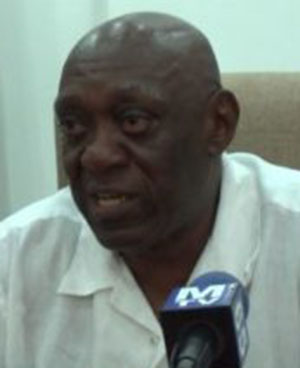Geotechnical engineer Charles Ceres says he will be filing a libel complaint with the police against Leader of the Opposition Bharrat Jagdeo and PPP/C parliamentarian Anil Nandlall after he said they distorted the manner in which he had been allocated several parcels of land.
“I intend to file a complaint with the police force in the same manner as the Balwant Singh Hospital since his assertions are false,” Ceres said in a public statement following Jagdeo’s claims.
Since making the allegation last week that the APNU+AFC government has been in a “mad rush” to allocate prime state lands to key officials and alleged supporters since the December 21st no-confidence vote, Jagdeo has faced severe criticism as documentation in cases he cited has not borne out his claims.
Ceres, in responding to Jagdeo’s claims last week, said that he is both contented and well educated and therefore does not need to steal to acquire wealth. “I can be successful anywhere in the world because of the education provided to me by the people of Guyana,” he said.
Jagdeo claimed last week that Ceres had been allocated 1297.1 acres in the Canje Creek, 112 acres at Bohemia in Berbice, 5,000 acres at a location yet to be identified and a plot at Liliendaal under the APNU+AFC government.
In response, Ceres provided documents to show that it was Jagdeo’s government which issued him and three others with land in the Canje Creek in 2004 which has since been relinquished and that the land at Liliendaal was bought above market value and is being beneficially occupied.
“I paid $1000.00/acre per year for the land in Canje Creek up to the time of relinquishment. I continue to pay $200,000 per acre/per year for the land in Liliendaal, which is being beneficially utilized as dictated by the terms of the lease,” he shared, while claiming that the PPP under Jagdeo and former president Donald Ramotar granted land to China Paper for $50 per acre per year.
Ceres accused the former president of being so focused “on the marginalization of African Guyanese to the extent that his memory has failed him.”
“He fails to remember that Charles Ceres et al was granted land in Canje by a government led by him,” he stressed adding that he was never issued land at Bohemia.
Speaking about the 4.5 acres he leased at Liliendaal, Ceres said, “Its development commenced one day after the lease was granted to Ground Structures Engineering Consultants (GSEC), a company owned by me and my children.” He said that GSEC currently provides employment for 40 young Guyanese including nine young people who are provided with allowances of $110,000 per month to attend the University of Guyana.
He further claimed that most of the lands allocated to others by the former PPP/C government is not beneficially occupied in accordance with the terms of the lease.
The businessman pointed out that he has never received payment either from the previous or current government though he has provided both with services.
“My dedication to Guyana and to its development is evidenced by free services I provided to the Jagdeo led government during the great flood of 2005. He can contradict this claim by providing evidence of any payment made to me for the services provided. I continued to provide services to the Granger administration similarly, free of cost. The reason the Granger government was unable to provide a salary in response to a question asked by Gail Teixeira about payments to Ministerial Adviser, Charles Ceres is because I requested no payment for my services,” he said.
Ceres went as far as to commit himself to making public, evidence of every cent he has earned and spent in Guyana since January 2000, the year Jagdeo entered office, provided that Jagdeo does the same.
“I will also authorise my bank, if requested by you, to provide validation of all my financial transactions if the costs to generate those statements are paid by the person(s) requesting the information,” he further said.
Ceres challenged the former president to prove himself equal by demonstrating equivalent levels of absence of corruption and ability to succeed without access to taxpayers’ resources.









